 UC Irvine law professor Rick Hasen was among the first to notice the "strange rephrasing" of the questions the U.S. Supreme Court agreed to hear [PDF] when it combined four different marriage equality challenges on Friday.
UC Irvine law professor Rick Hasen was among the first to notice the "strange rephrasing" of the questions the U.S. Supreme Court agreed to hear [PDF] when it combined four different marriage equality challenges on Friday.
The questions from the different appellate court challenges that the Court agreed to entertain --- after the 6th Circuit broke with every other federal appeals court in the nation and allowed restrictions to remain on marriage rights in Michigan, Kentucky, Ohio and Tennessee --- were combined to just two questions on which the Supremes agreed to hear arguments:
2) Does the Fourteenth Amendment require a state to recognize a marriage between two people of the same sex when their marriage was lawfully licensed and performed out-of-state?
Hasen described the way the first question was written as "quite odd", explaining: "Rather than ask about an equal right of gays and lesbians to marry same sex partners, it asks about the right of the states to deny same sex marriage."
Indeed, amid the jubilation following the narrow 2010 ruling by SCOTUS in the Windsor case, which effectively struck down the federal Defense of Marriage Act (DOMA), The BRAD BLOG's legal analyst Ernest Canning pointed out that "by limiting its decision...the court left open to future adjudication of two vitally important questions":
2. Must states, which do not permit same-sex couples to marry, recognize the marital rights of those same-sex couples who have chosen to marry in other states where it is permitted?
Note the difference in the wording of Canning's "unresolved questions" from 2010 and how the Court has subtly adjusted the issue raised in the first question to become one of state's rights, rather than of equal justice under the law for the same-sex couples to be married there.
Hasen observes that the Court's new wording also "leaves open the possibility that states could get out of the marriage business entirely," as unlikely as they may seem. Other legal experts, such as Ilya Shapiro at Forbes, agreed the re-wording of questions by the Court was "unusual". "Typically the justices simply decide whether to take a case based on the petitioners' articulation," he explained.
Hasen says the unusual reframing by the Court and the late hour in the day on Friday that their order was finally released, "raises the question of why were they rewritten" in the way they were, and "with an accompanying direct order --- I've not seen that before --admonishing the parties to stick with discussing these questions presented."
So, is something afoot here?...
Harvard law professor Laurence Tribe speculated that the reworded questions may simply be little more than "good housekeeping", the result of combining all four cases into a single challenge at the Court. But, he also told the New York Times that "The rephrased questions technically leave open a middle path along which the court would prevent states from discriminating against same-sex couples lawfully married in their home states without requiring any state to take the affirmative step of issuing its own marriage licenses to same-sex couples."
Indiana University's law professor Steve Sanders, writing at the American Constitution Society blog speculates: "Chief Justice Roberts (who may be thinking about how history will judge him) might see the possibility for some creative middle ground: 'yes' on the right to remain married, but 'question-reserved-for-another-day' on the right to get married."
"A limited, one-step-at-a-time approach, if done right, might at least mute the inevitable eruptions from Justices Scalia and Alito toward any decision that takes away states' rights to continue disparaging gay relationships," Sanders avers. Well, we'd hate to make the "Scalitos" unhappy or see states lose their "right" to discriminate against their own residents.
"In a year or two, the Court could come back," Sanders continues, "and finally drag Alabama, Mississippi and Texas into line. Not unlike Roberts' opinion upholding Obamacare on taxing-power rather than the commerce clause grounds, such a result could be seen as statesmanlike, even Solomonic."
Hasen, too, speculated that this could be an attempt by Chief Justice John Roberts to split the baby. "This strikes me as the handiwork of the Chief Justice, perhaps looking for a way to have as narrow a win for same sex couples as it is possible to achieve," he wrote. "That is, if the Chief calculates that Kennedy and the liberals are going to reverse the Sixth Circuit no matter what, perhaps this is a way to have that majority write as narrow an opinion as possible"
Ultimately, however, Tribe told the Times that he "doubt[s] that the court will in the end stop with that half measure." Others, Hasen explained in an update to his original piece, told him they believed that the reframed questions and admonition to stick to them, "related more to the fact that some of the petitions presented only one of these two issues, and the parties should each address only the one they've gone up on."
The Washington Post's Robert Barnes offered that the structure mandated by the Court --- which will allow 90 minutes of argument on the first question and an hour on the second (more than usual 60 minutes total allowed for cases) --- would "allow the court to approach the issue on all fronts."
"The justices will consider licensing requirements in the Michigan case, recognition of marriages performed elsewhere in the Ohio and Tennessee challenges and both in the Kentucky cases," Barnes explains.
Perhaps. But I think the "grand gay rights/federalism compromise" Sanders described, and Hasen initially suggested, might be what we will be looking at after oral arguments are made in April, when the Court finally returns with its decision as expected in June.
To be sure, as The BRAD BLOG has been arguing since at least 2010 --- back when there was a still a real question for many about the future of marriage equality in this nation (long before same sex marriages were allowed in the current 36 states and District of Columbia) --- the fight for equal marriage rights for gays and lesbians under the law is "all but finally settled." The only question then, as now: how long will it take for those rights to be fully recognized in every state in the union?
Following the Supremes' narrow Windsor decision in 2013, every single federal court to hear a challenge to a state ban on same-sex marriage has found such restrictions to be in violation of the Constitution --- up until the 6th Circuit's recent ruling. The issue has, in the bargain, moved faster than pretty much anybody could have imagined over the past year and a half. And now, with the recent appellate court split (conveniently) created by the 6th Circuit, the Supreme Court has finally found a foothold in which it can dig in to hold off the inevitable for a bit longer, if it wants.
Why it would want to continue to delay the inevitable (and the obviously correct Constitutional decision) remains another question. But with "constitutional conservatives" like Antonin Scalia (who is actually nothing of the sort) on the Court, anything is possible.
Allow me to go out on a limb here. I think Hasen may have had this one right when he initially speculated that the Court may have "stacked the deck against gay marriage" in its reframing of the questions. The decision to allow marriage equality in all 50 states is certainly coming eventually, and it will likely be soon. But, despite the optimism heard from rights groups on Friday after the Court agreed to hear these particular cases, this may not be the moment that finally seals the deal. I hope I'm wrong.


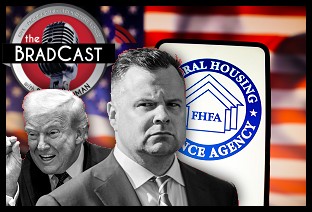 Trump's 'Cook'ed-Up Mortgage Fraud Claims: 'BradCast' 9/3/25
Trump's 'Cook'ed-Up Mortgage Fraud Claims: 'BradCast' 9/3/25  While We Were Out:
While We Were Out: 'Green News Report' 9/2/25
'Green News Report' 9/2/25
 Sunday 'Shots and Prayers' Toons
Sunday 'Shots and Prayers' Toons Cynical Hypocrisy Behind Right-Wing Opposition To CA's 'Election Rigging Response Act'
Cynical Hypocrisy Behind Right-Wing Opposition To CA's 'Election Rigging Response Act'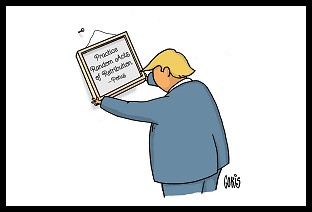 Sunday 'Random Acts of' Toons
Sunday 'Random Acts of' Toons From CA's 'Nuclear Deterrence' Map to Newsom's Trolling to Trump's 'Fascist Theatre' and Beyond: 'BradCast' 8/21/25
From CA's 'Nuclear Deterrence' Map to Newsom's Trolling to Trump's 'Fascist Theatre' and Beyond: 'BradCast' 8/21/25 'Green News Report' 8/21/25
'Green News Report' 8/21/25 'Americanism' and Trump's 'Stalinesque' Plot to Whitewash History: 'BradCast' 8/20/25
'Americanism' and Trump's 'Stalinesque' Plot to Whitewash History: 'BradCast' 8/20/25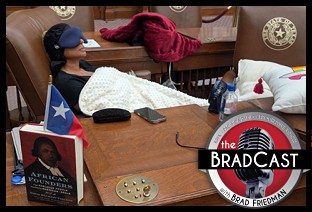 Texas GOP Imprisons Dem State Lawmaker in State House Chamber: 'BradCast' 8/19/25
Texas GOP Imprisons Dem State Lawmaker in State House Chamber: 'BradCast' 8/19/25 'Green News Report' 8/19/25
'Green News Report' 8/19/25 Trump, Nazis and Trump's Nazified Elections: 'BradCast' 8/18/25
Trump, Nazis and Trump's Nazified Elections: 'BradCast' 8/18/25 Sunday '
Sunday ' Newsom's 'Election Rigging Response Act'; FCC's License Renewal for Sock-Puppeting Sinclair: 'BradCast' 8/14/25
Newsom's 'Election Rigging Response Act'; FCC's License Renewal for Sock-Puppeting Sinclair: 'BradCast' 8/14/25 'Green News Report' 8/14/25
'Green News Report' 8/14/25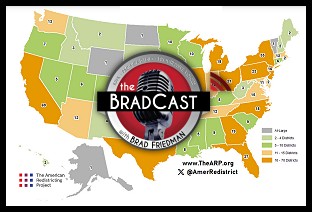 140 New House Reps?: Moving Beyond the Gerrymandering Wars: 'BradCast' 8/13/25
140 New House Reps?: Moving Beyond the Gerrymandering Wars: 'BradCast' 8/13/25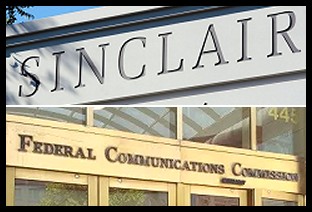 FCC Renews Sinclair Licenses Despite Complaint from Petitioner Who Died
FCC Renews Sinclair Licenses Despite Complaint from Petitioner Who Died It's Not About the Rule of Law, It's About Authoritarian Control: 'BradCast' 8/12/25
It's Not About the Rule of Law, It's About Authoritarian Control: 'BradCast' 8/12/25 After Vaccine Cancels, CDC Shooting, Former Officials Want RFK Out: 'BradCast' 8/11/25
After Vaccine Cancels, CDC Shooting, Former Officials Want RFK Out: 'BradCast' 8/11/25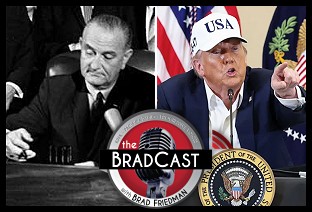 Trump Wars Against Greem Energy, Democracy on VRA's 60th: 'BradCast' 8/7
Trump Wars Against Greem Energy, Democracy on VRA's 60th: 'BradCast' 8/7 Media Conglomerates Continue Trump Capitulation: 'BradCast' 8/6/25
Media Conglomerates Continue Trump Capitulation: 'BradCast' 8/6/25 Banana Republican: Trump Shoots the Labor Statistics Messenger: 'BradCast' 8/5/25
Banana Republican: Trump Shoots the Labor Statistics Messenger: 'BradCast' 8/5/25 All's Fair in Love, War and, Apparently, Part-isan Gerrymandering: 'BradCast' 8/4/25
All's Fair in Love, War and, Apparently, Part-isan Gerrymandering: 'BradCast' 8/4/25
 VA GOP VOTER REG FRAUDSTER OFF HOOK
VA GOP VOTER REG FRAUDSTER OFF HOOK Criminal GOP Voter Registration Fraud Probe Expanding in VA
Criminal GOP Voter Registration Fraud Probe Expanding in VA DOJ PROBE SOUGHT AFTER VA ARREST
DOJ PROBE SOUGHT AFTER VA ARREST Arrest in VA: GOP Voter Reg Scandal Widens
Arrest in VA: GOP Voter Reg Scandal Widens ALL TOGETHER: ROVE, SPROUL, KOCHS, RNC
ALL TOGETHER: ROVE, SPROUL, KOCHS, RNC LATimes: RNC's 'Fired' Sproul Working for Repubs in 'as Many as 30 States'
LATimes: RNC's 'Fired' Sproul Working for Repubs in 'as Many as 30 States' 'Fired' Sproul Group 'Cloned', Still Working for Republicans in At Least 10 States
'Fired' Sproul Group 'Cloned', Still Working for Republicans in At Least 10 States FINALLY: FOX ON GOP REG FRAUD SCANDAL
FINALLY: FOX ON GOP REG FRAUD SCANDAL COLORADO FOLLOWS FLORIDA WITH GOP CRIMINAL INVESTIGATION
COLORADO FOLLOWS FLORIDA WITH GOP CRIMINAL INVESTIGATION CRIMINAL PROBE LAUNCHED INTO GOP VOTER REGISTRATION FRAUD SCANDAL IN FL
CRIMINAL PROBE LAUNCHED INTO GOP VOTER REGISTRATION FRAUD SCANDAL IN FL Brad Breaks PA Photo ID & GOP Registration Fraud Scandal News on Hartmann TV
Brad Breaks PA Photo ID & GOP Registration Fraud Scandal News on Hartmann TV  CAUGHT ON TAPE: COORDINATED NATIONWIDE GOP VOTER REG SCAM
CAUGHT ON TAPE: COORDINATED NATIONWIDE GOP VOTER REG SCAM CRIMINAL ELECTION FRAUD COMPLAINT FILED AGAINST GOP 'FRAUD' FIRM
CRIMINAL ELECTION FRAUD COMPLAINT FILED AGAINST GOP 'FRAUD' FIRM RICK SCOTT GETS ROLLED IN GOP REGISTRATION FRAUD SCANDAL
RICK SCOTT GETS ROLLED IN GOP REGISTRATION FRAUD SCANDAL VIDEO: Brad Breaks GOP Reg Fraud Scandal on Hartmann TV
VIDEO: Brad Breaks GOP Reg Fraud Scandal on Hartmann TV RNC FIRES NATIONAL VOTER REGISTRATION FIRM FOR FRAUD
RNC FIRES NATIONAL VOTER REGISTRATION FIRM FOR FRAUD EXCLUSIVE: Intvw w/ FL Official Who First Discovered GOP Reg Fraud
EXCLUSIVE: Intvw w/ FL Official Who First Discovered GOP Reg Fraud GOP REGISTRATION FRAUD FOUND IN FL
GOP REGISTRATION FRAUD FOUND IN FL

































